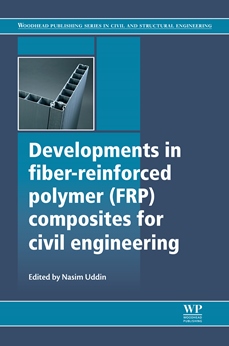May 14 2013
The use of fiber-reinforced polymer (FRP) composite materials has had a dramatic impact on civil engineering techniques over the past three decades.
FRPs are an ideal material for structural applications where high strength-to-weight and stiffness-to-weight ratios are required. Developments in fiber-reinforced polymer (FRP) composites for civil engineering outlines the latest developments in fiber-reinforced polymer (FRP) composites and their applications in civil engineering.
 Developments in fiber-reinforced polymer (FRP) composites for civil engineering. Published by Woodhead Publishing.
Developments in fiber-reinforced polymer (FRP) composites for civil engineering. Published by Woodhead Publishing.
Part one outlines the general developments of fiber-reinforced polymer (FRP) use, reviewing recent advancements in the design and processing techniques of composite materials. Part two outlines particular types of fiber-reinforced polymers and covers their use in a wide range of civil engineering and structural applications, including their use in disaster-resistant buildings, strengthening steel structures and bridge superstructures.
With its distinguished editor and international team of contributors, Developments in fiber-reinforced polymer (FRP) composites for civil engineering is an essential text for researchers and engineers in the field of civil engineering and industries such as bridge and building construction.
Based in Cambridge, England, Woodhead Publishing is a leading international publisher of Materials and Engineering books.